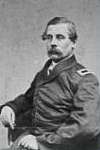General Thomas Francis Meagher

Almost everyone has heard of General Thomas Francis Meagher, the very popular commander of the Union Irish Brigade, but how many of you know of the colourful life and accomplishments of Meagher before, and after, the War Between the States.
Meagher was born in 1823 to a fairly wealthy and influential family in the town of Waterford in the Southeast part of Ireland. As a young man, he was sent away to be educated at a Jesuit school in County Kildare but later transferred to Stoneyhurst College in Lancashire, England. It was from here that Meagher graduated in 1843 and he returned to Ireland to continue his studies further and become a lawyer. At the age of 23, he made his first venture into politics and due to the fiery nature of his oratory, he became known as "Meagher of the Sword". As he and his "Young Ireland" party became more influential and well known, his speeches were often quoted by admirers in Ireland and even overseas in France and America. He was so admired in France that they sent him a tricolour flag similar in design to the French National flag except with Green, White and Orange as the three colours. (This same flag would eventually be flown in the 1916 uprising and would be adopted as the official flag of independent Eire in 1937) During the potato famine in 1848, Meagher and other members of his Young Ireland party took part in a rebellion but due to lack or arms and support, they were soon arrested and charged with "Treason against the Queen". During the trial Meagher had the audacity to instruct the judge that if he would only be lenient in his sentencing, Meagher and his friends would not only repeat the treason but would try much better to succeed and not get caught a second time!
Meagher and his fellow prisoners were sentenced to be "hung, drawn and quartered" a particularly vicious death but due to public outcry the sentence was reduced to deportation for life to Van Diemans Land which is now known as Tasmania. This reduced sentence proved to be a costly one to England and the Crown for, of the nine men who were deported, Meagher and two others would become U.S. Army generals, one would become Governor General of Newfoundland, one the Attorney General of Australia, one a member of Parliament in Canada and one very prominent in New York public affairs. It was 1849 when Meagher was deported but he and others escaped and in 1852 Meagher showed up in San Francisco. Travelling on to New York, he promptly took up his law studies for three more years and was finally admitted to the bar. In 1856 he started his own newspaper called "The Irish News" and in 1858 he had a report published in Harper's Weekly about an expedition he had just made to Central America. All this publicity made him a leader of the Irish community in New York and so when The War Between the States began in 1861, Irishmen flocked to join the brigade being organised by Meagher. The exploits of this brigade are legendary at Antietam, Gettysburg, and especially at Fredericksburg where the brigade would suffer appalling losses in many fruitless charges against well protected Confederate positions.
After the war, Meagher and his friends encouraged many Irish families to move out to the western territories with them and it was in 1865 that Meagher was made territorial secretary of Montana, serving under governor Edgerton. When the governor left Montana on an extended trip, Meagher became acting governor and was promptly branded as inept in the job. He was also accused of being a womaniser and a drunkard. Most of these charges were brought against Meagher by vigilantes who were still operating in Montana territory at the time. The furious opposition to Meagher forced him to organise cavalry troops to help enforce the rules in the territory. It was on July 1st of 1867 that Meagher left for Fort Benton with "a large amount of money" to purchase arms and ammunition for his cavalry enforcers. On arrival at Fort Benton he found that the supply shop carrying the arms was late in arriving and being extremely impatient, he decided to take a steamer to travel down river to meet the supply ship. Meagher was seen boarding the steamer but was never seen again nor was his body ever found. The large amount of money also vanished with him. He was officially reported as "having wandered on deck and drowned after falling overboard". Many people suspected he had been murdered or even committed suicide, but many more vouched that he and the money had simply disappeared back to Ireland to fight once again for Irish freedom. Whatever the fate of Meagher, there is a popular saying amongst exiled Irishmen which says, "May you die in Ireland". Maybe he did.
The above article first appeared in the ACWS Newsletter, December 1999
